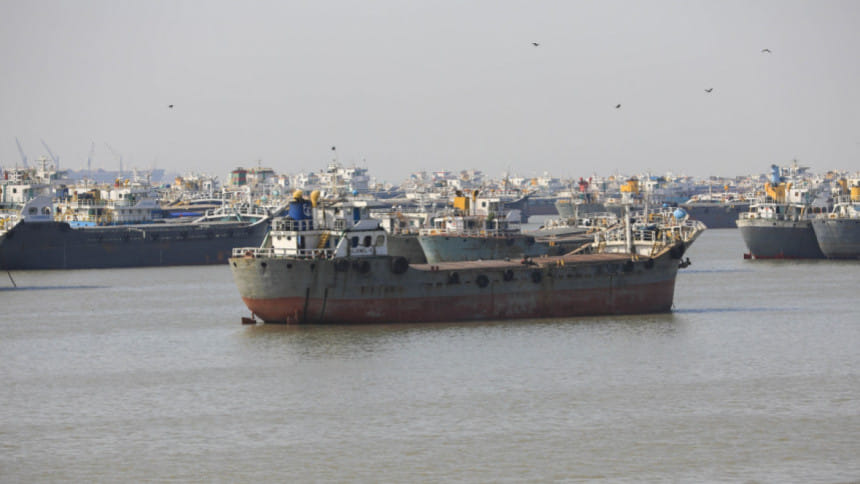New policy for goods transport by lighters draws opposition

A recently formulated policy for transporting imported cargoes from Chattogram to different parts of the country has failed to be enforced thanks to strong opposition from importers and vessel owners, as they accused the system of posing threats to monopolise control over vessel serials and fares.
Framed on October 15, the policy has mandated the private platform Bangladesh Water Transport Coordination Cell (BWTCC) to control the maintenance of serials and allocation, and the determination of freight rates of the vessels.
Businessmen allege that allowing a single cell to do so is an attempt to reinstate the recently ended monopoly and syndication in imported bulk cargo transport through inland water routes. They claim the policy contradicts the Competition Act and the spirit of a free market economy.
In the face of opposition from Chattogram-based lighter vessel owners, the Water Transport Coordination Cell failed to start its scheduled operation on Thursday.
More than 10 crore tonnes of annually imported bulk cargo, including commodities, fertilisers and industrial raw materials, are unloaded from mother vessels at the outer anchorage of Chattogram port onto lighter vessels and transported through 40 different inland water routes.
Over 1,800 lighter vessels are engaged in this job.
According to the new policy, a 10-member supervisory committee led by the Director General (DG) of the Department of Shipping would monitor the activities of the cell.
Without allocation and permission from the coordination cell, no lighter vessel, except for those owned by business groups, would be allowed to transport cargo from mother vessels, the policy mandates.
It mentioned some conditions for factories and companies in using vessels.
According to the policy, the group of companies that own lighter vessels would have to carry only their cargo with permission from the shipping department.
Besides, the business groups would not be allowed to increase their fleet with hired vessels or carry cargo by vessels that are in their fleet but not registered in the name of that factory.
"Such a policy is directly against the freedom of trade guaranteed under the Competition Act," said Mohammed Amirul Haque, chairman of Seacom group.
Alleging that the hurried move to formulate such a policy is an attempt to reinstate the old, unholy syndication of a section of corrupt politicians turned businessmen of the ousted government over controlling lighter vessel operations, he questioned the authority of the Department of Shipping to reinstate the serial system in allocating lighter vessels.
In 2004, three vessel owners' organisations jointly formed a single platform named the Water Transport Cell (WTC) to operate vessels for the transport of import cargoes in inland waterways.
The organisations are the Bangladesh Cargo Vessel Owners Association, the Coastal Ship Owners Association of Bangladesh and the Inland Vessel Owners Association of Chattogram.
After facing long delays in vessel allocation and higher freight rates from the Water Transport Cell, different industrial groups and importers started buying and hiring lighter vessels to transport their imported cargo since 2011.
In December last year, raising allegations of financial irregularities against the Cargo Vessel Owners Association, leaders of the Inland Vessel Owners Association of Chattogram severed ties with the Water Transport Cell and started operating vessels separately.
"As the Water Transport Cell was abolished, importers and vessel owners were able to negotiate freight rates, which significantly reduced transport costs," said Parvez Ahmed, spokesperson of the Inland Vessel Owners Association of Chattogram.
Satyajit Das Barman, head of Business (Grains and Logistics) at TK Group, said they faced no hassle in timely acquiring the desired number of lighter vessels by directly negotiating with vessel owners in the last nine months.
Meanwhile, the freight cost on the Chattogram-Dhaka waterway dropped by around Tk 120 per tonne, said Barman.
"Reinstating the serial system and giving the sole mandate to a single platform would bring back the old syndication," he added.
However, Commodore Mohammad Maksud Alam, director general of the shipping department, said the policy has been formulated to bring discipline to the trade and establish equal competition.
"There is no possibility of creating a monopoly in the trade as a supervisory committee will oversee the activity of the new platform to check for malpractice," he said.
He alleged that a section of vessel owners offered very poor freight rates in the absence of a disciplined system, causing a large portion of vessels to incur losses.

 For all latest news, follow The Daily Star's Google News channel.
For all latest news, follow The Daily Star's Google News channel. 



Comments